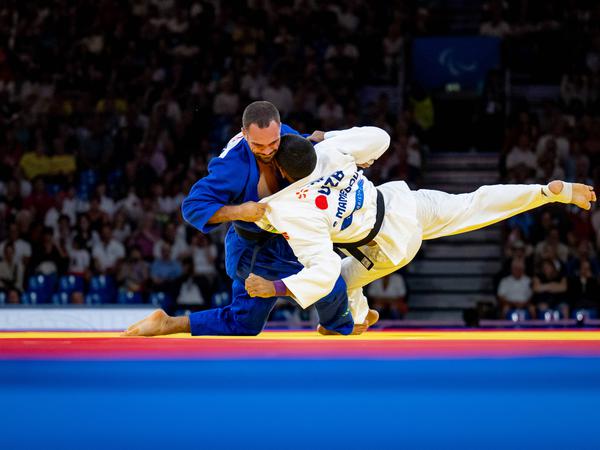With his head bowed, Lennart Sass walks onto the Paralympic mat on the referee’s arm. Only when he bows does he raise his chin, bend his upper body in front of his opponent and then stands up straight. Sass rolls up his sleeves once more, then he grips the Uzbek Shokhrukh Mamedov firmly in the fight for bronze.
It is the third of three fights on Friday at the Paralympics in Paris for the visually impaired judoka from Heidelberg. In the field of 16 participants in the J1 starting class up to 73 kilograms, Sass first competed against the Portuguese Djibrilo Iafa and won comfortably with an O-soto-gari, a traditional judo throw, after only one minute of fighting time. Yergali Shamey also had Sass well under control in the semi-finals. He was leading 1-0 against the Kazakh and wanted to “fight down the time”.
But then, 35 seconds before the end, he was disqualified for so-called diving – a controversial decision. “It is very questionable,” says national coach Carmen Bruckmann. “I was sitting in the warm-up with coaches from other countries and everyone said: ‘Huh, why?'” Controversial or not, the athlete quickly accepted the decision. “What else can I do?” asked Sass. “I respected it immediately and switched to the bronze medal fight.”
When the 24-year-old grabbed his opponent’s white Uwagi, or cotton jacket, in the fight in question, it didn’t take a second for both judoka to throw themselves into the fight. They shifted their body weight downwards and Sass dragged the Uzbek several meters with him. After ten seconds, both landed on the mat for the first time and continued to wrestle on their knees for an advantage.
The German broke his collarbone in May. For Sass, it was just “a small setback and not worth mentioning.” In the meantime, he has compensated for and built on other weaknesses. In recent years, Paris has always been the goal after goal. “My whole path here was rocky, but the fact that I am able to stand here is the culmination of my sporting development,” said Sass.
Against Mamedov, the world number two is focused and confident. He ignores the loudly shouted instructions of the Uzbek coach and dominates the fight for another twenty seconds. “My performance today is largely due to the self-confidence I regained on the mat,” said Sass, who started judo in 2005. During his youth, he decided to play handball for a while, but in 2016, when he became completely blind due to the rare hereditary disease Leber’s optic atrophy, or LOHN for short, he switched back to martial arts. “It was a general change in life to become independent and live with my fate,” he said.
After exactly 38 seconds of fighting, Lennart Sass throws his opponent Shokhrukh Mamedov for the first time and takes a 1-0 lead. In the stands, his personal fan club in yellow “Team Sass” shirts cheers him on loudly. The law student stays completely composed, takes two deep breaths and makes contact with the Uzbek again.
This mental strength has always been Sass’s hallmark. Others call him a “mental beast,” but he says of himself that he would be there and willing to fight when it mattered. “That’s my strength,” he explains.

© IMAGO/Ralf Kuckuck
It was also certain that after being knocked out in the semi-finals, the dream of gold, which the athlete and the national coach considered realistic, was shattered. “As a fighter, I’m going onto the mat here to win gold,” says Sass. “In the qualifications before Paris, I showed that I can beat anyone. I’m in top form.” Coach Bruckmann also gave him the best chances of winning a medal. “I think he can do it. He’s the most stable and professional of the German team.”
He was able to show this when he defeated the Romanian world number one Florin Alexandru Bologa at the Grand Prix in February. This encounter was also his desired final encounter, he said before the Paralympics in Paris.
The disqualification in the semi-finals was all the more annoying. But Sass quickly found his focus; for him, “bronze is the new gold.” And that’s how he fought, when after 51 seconds of fighting he outwitted the Uzbek and brought him down with an Ippon, the throw with the highest score. The hall applauded as Sass closed his eyes in relief and clenched his hands into fists. He kissed both of his knuckles before raising them in the air. Deep breath, one last bow. Then he fell into the arms of his opponent Mamedov and then his coach.
My whole road to get here was rocky, but the fact that I am allowed to stand here is the culmination of my sporting development.
Lennart Sass
“A medal was the goal, and now it’s been achieved. Even if we might have wanted a different color,” said the national coach. Sass was a little more euphoric: “I’m damn proud that I got a medal here at my first Games.”
The 24-year-old is the first German from the Para Judo team to go home with a medal – and before that to the German House. “I can party, I’m definitely up for celebrating the medal,” promised Sass after the competition. “I’ll keep partying until my teammate is on the mat tomorrow morning.” He’s referring to Daniel-Rafael Goral, who competed in the men’s up to 90 kilograms on Saturday morning and took seventh place.
